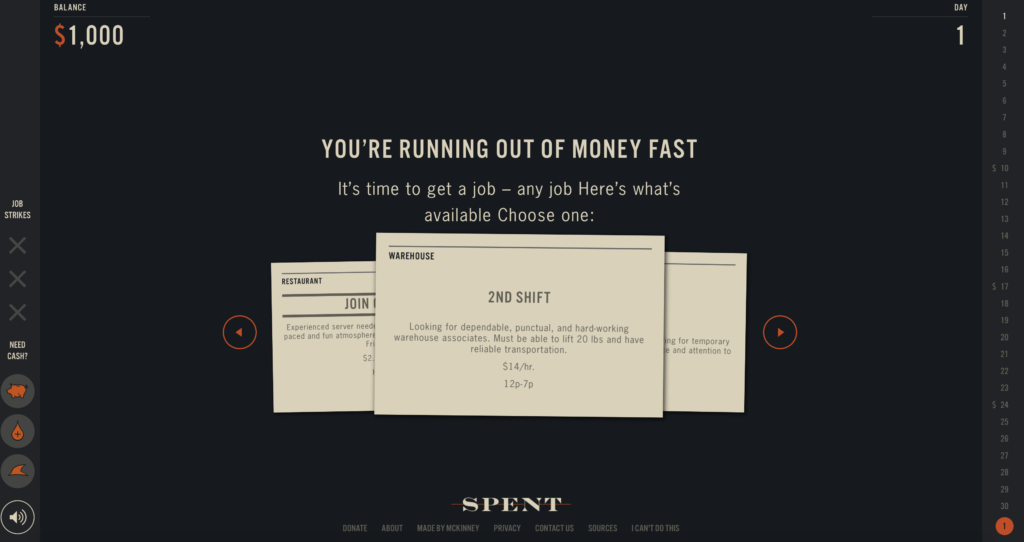I recently found out that the manual for The Sims (2000) contains a “Recommended reading” appendix with 12 books about “the background and social issues entertained in The Sims”. And yes, video games used to come in a box with an extensive user manual (93 pages in this case!). But I digress; the point is, many of the video games we play depict real social issues that surround us. Some video games go so far as to use open data (or at least, statistics) in their representation. I think video games are a way of representing data, such as the lived experience of the game designer (see Spent) or biased newspaper titles (see NYTimes Simulator). Below, I will show 4 games that extensively use open data (or statistics) to depict a social issue. I included links for games that can be played in the browser. A final note: video games are not inherently “better” or “more powerful” than other data visualization approaches, but, as argued by Ian Bogost, they can “make claims about the world, which players can understand, evaluate, and deliberate”.
Spent

Spent is a game on the issue of poverty. It was produced by the Urban Ministries of Durham (North Carolina) in collaboration with McKenney, an advert. The game was intended to raise donations for the Urban Ministries of Durham (UMD), who do charity work. The game was designed by Jenny Nicholson, a copywriter at UMD who grew up poor. The player starts with 1000$ in the bank and needs to find a job, a place to rent, pick health insurance, and face unexpected expenses. Each decision has a cost, and the player needs to somehow make it to the end of the month. The game relies on real statistics and studies about the cost of health insurance, affordable housing, the number of people who had their electricity contract terminated because they missed their payment, the number of people who show up to work even when sick. As explained by Nicholson in this interview by FastCompany:
When we talk about poverty and helping people in poverty, that gets lost. It’s not a matter of making the right decision, or making the smart choice. When you’re in that situation, there is no right choice.
Psychologists have studied the effects of the game on attitudes towards the poor. This study found that attitudes towards poverty were unaffected or even negatively affected after playing the game. If the player is able to “beat the game”, then poverty appears as something that is relatively easy to overcome, if one makes the right individual choices.
Other games on the issue of poverty which use real world data include Nanopesos, and Survive 125. On the issue of wealth inequality, see also You are Jeff Bezos. And on the worrying state of the pension system in Chile, see Rompechanchitos, which used statistics from Chile’s Superintendency of Pensions.
RunThatTown

RunThatTown is a town building game commissioned by the Australian Bureau of Statistics (ABS). The game is a twist on the city-building simulation genre. The player inputs their postal area and becomes a local politician, who needs to approve or reject proposals for public works and become more popular in that neighborhood. The game shows the popularity of the proposal with citizens based on real census data. For example, a proposal to build a community club might be very popular in a neighborhood where there is a larger share of citizens over the age of 65. Through the gameplay, players discover how open data can be used to make decisions, as well as what the demographics of their neighborhood look like.
GovHack games by Tim Nugent
This is a series of games made by Tim Nugent and others during GovHack AU, an “annual open government data hackathon held in Australia”. For example, in Marvellous Ultimate Appliances, the players shop for energy appliances with different star levels (efficiency) and then make them battle against each other. The game uses data on the star ratings of energy appliances. One of the aims of the game is “making people more aware of the power consumption, energy usage, and cost-to-capacity implications of typical consumer appliances”. For more GovHack games see this blog post by Tim Nugent.
NYTimes Simulator

Data from NYT Diff used in NYTSimulator. Screenshot reprinted from “The New York Times Simulator – Release Notes”
NYTimes Simulator is a game made by Molleindustria (aka Paolo Pedercini) to show biased news coverage of political issues such as the Palestinian struggle. The player has to choose headlines for the newspaper. Headlines will affect the approval of three different interest groups: “the police”, “Israel”, “The Rich”. For example, plushing the headline “Climate: Making the Case for Capitalism” will increase approval from The Rich. As Pedercini explains in this interview by Gamers with Glasses:
For the research, I relied a lot on fair.org, a respectable news watchdog with many thematic articles. I included in the game a lot of actual New York Times edits from NYTDiff which is an automated system that keeps track of headline changes after the publication. I also used Google News to compare how different outlets covered the same event. When you “edit” a headline in the game you often switch between actual headlines from different outlets. The game data is public and annotated, you can find it here.


